How the epidemic disrupted Orbán’s machinery
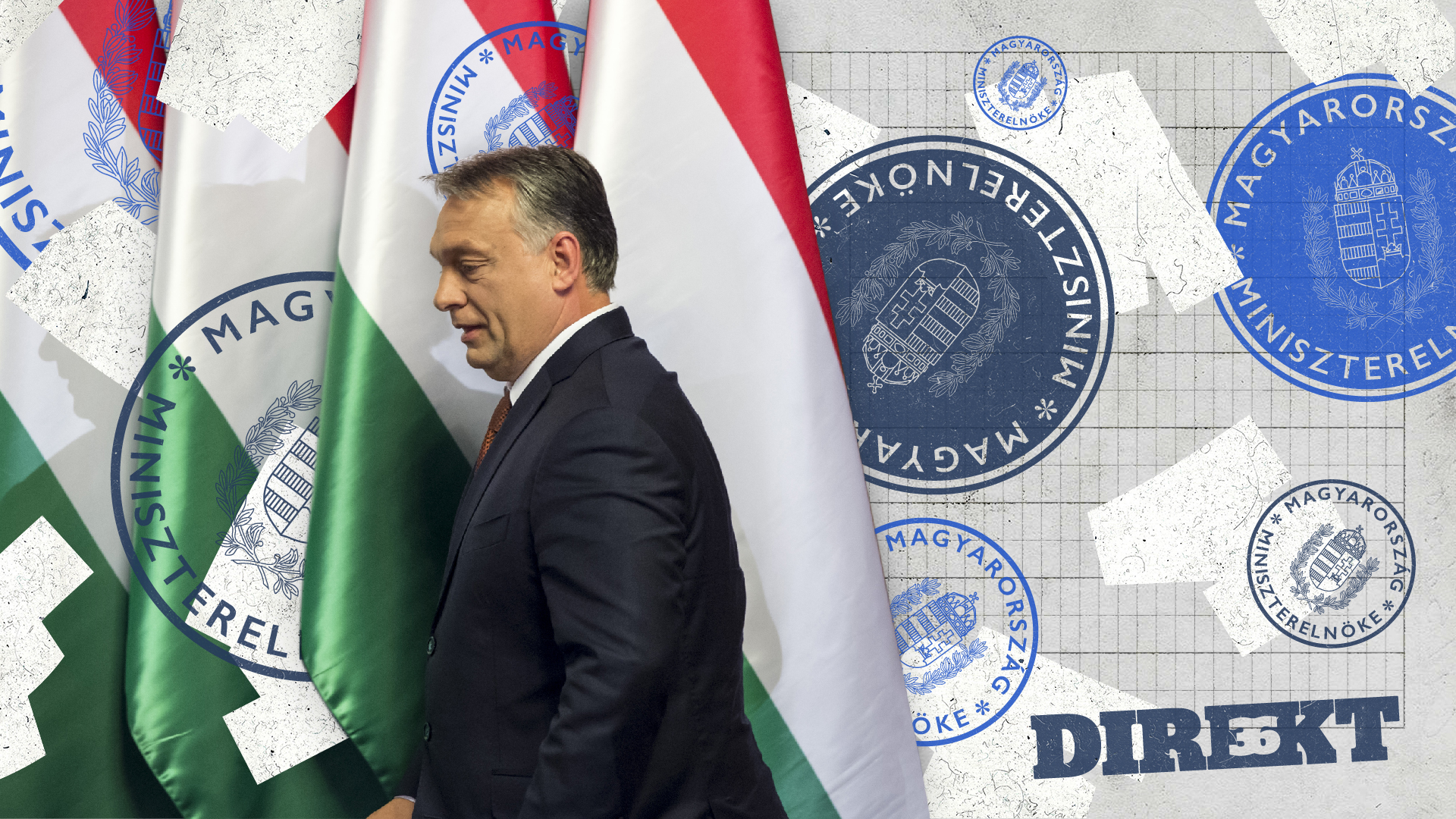
In a two-minute video published on his Facebook page on Thursday before Easter, Prime Minister Viktor Orbán made important announcements. He spoke with his usual confidence but, perhaps as a sign of hurried times, he read some parts of his speech from handwritten paper notes.
This was the moment when he announced the extension of the partial curfew due to the COVID-19 crisis and gave mayors extra rights to introduce locally adapted measures for the upcoming Easter period.
The part about the extra rights was met with surprise at several local municipalities. Just a few days earlier, the government had introduced a proposal that would have significantly curbed the rights of mayors. Now Orbán made a step in the opposite direction. The confusion grew even bigger when it turned out that not even senior government officials had been briefed about the details of the move.
After Orbán’s video announcement, one of the opposition-led municipalities contacted several high-ranking government officials, but none of them were fully aware of what exactly was going on. Details were only revealed hours later, at around 11 pm, when the text of the government decree was published in the Official Journal. Municipalities that had already been under big pressure had to hurry up to introduce their own local rules starting from the following day, Good Friday.
This episode shows how the epidemic forced the usually very disciplined Orbán government into seemingly chaotic and rushed decisions. While in the past ten years the government seemed to operate with almost military-style discipline, the last few weeks brought several U-turns from the Orbán administration. In some cases, decisions were changed within days or even hours.
One example of such a turn was when Orbán reversed his decision about the necessity of school closure within one day. According to government sources, Orbán does not like to act based on outside pressure, however, encountering the public reaction in this case made him quickly change his view. He recognized the political risks involved in keeping the schools open when more and more parents were afraid to take their children there.
The government also made an about-face in connection with a law that gave special authorization to Orbán. Government officials first seemed willing to seek a compromise with the opposition, but then suddenly took up a confrontative position. According to government sources, this change was partly the idea of Árpád Habony, Orbán’s combative unofficial advisor.
Another sign of hesitancy was when the government introduced the law that would have curbed the rights of mayors, only to withdraw it within one day. This showed a lack of internal coordination – the proposal was opposed by Gergely Gulyás, the powerful minister heading the Prime Minister’s Office, and several influential mayors from the governing party Fidesz also expressed objections in the background, including András Cser-Palkovics, the mayor of Székesfehérvár.
Government insiders explain these swift turns with the challenge of managing several issues simultaneously, facing a huge influx of information. According to them, this does not mean that the government is losing control. They say that Orbán in fact is enjoying situations like these, when he can present himself as a crisis manager and a problem solver.
In order to reconstruct the political twists and turns of the past weeks, we conducted in-depth interviews with more than a dozen people – government sources as well as opposition politicians who were present at government-initiated meetings. The government and Orbán’s Fidesz party have not responded to our questions.
The day when life overruled Orbán
The government was in the middle of building up a new political campaign when the COVID-19 epidemic broke out. In his January press conference, Orbán mooted the topic of compensation for school segregated Roma and for convicted prisoners. He said that, due to these two issues, “people’s sense of justice was wounded.”
While these might have seemed only random comments at that time, soon the whole government machinery pivoted toward the compensation issue. This was going to be the subject of a new campaign – similarly to the anti-migration campaigns from previous years – which would have been further elevated by a so-called national consultation in spring.
However, the COVID-19 crisis made an abrupt end to this careful planning and forced the government to take extraordinary measures. On March 11, the government announced the state of emergency and also ordered the closure of universities, since the first confirmed COVID-19 cases were university students.
The government seemed less confident when it came to the question of schools and kindergartens. First, the government did not consider the closure of schools justified. “More than one million school-children staying at home and not stepping out to the streets – that is out of question,” Minister Gulyás Gergely stated at the press conference when the state of emergency was announced. The government also said that school headmasters did not have the right to order an extraordinary school break, this can only be done by the government.
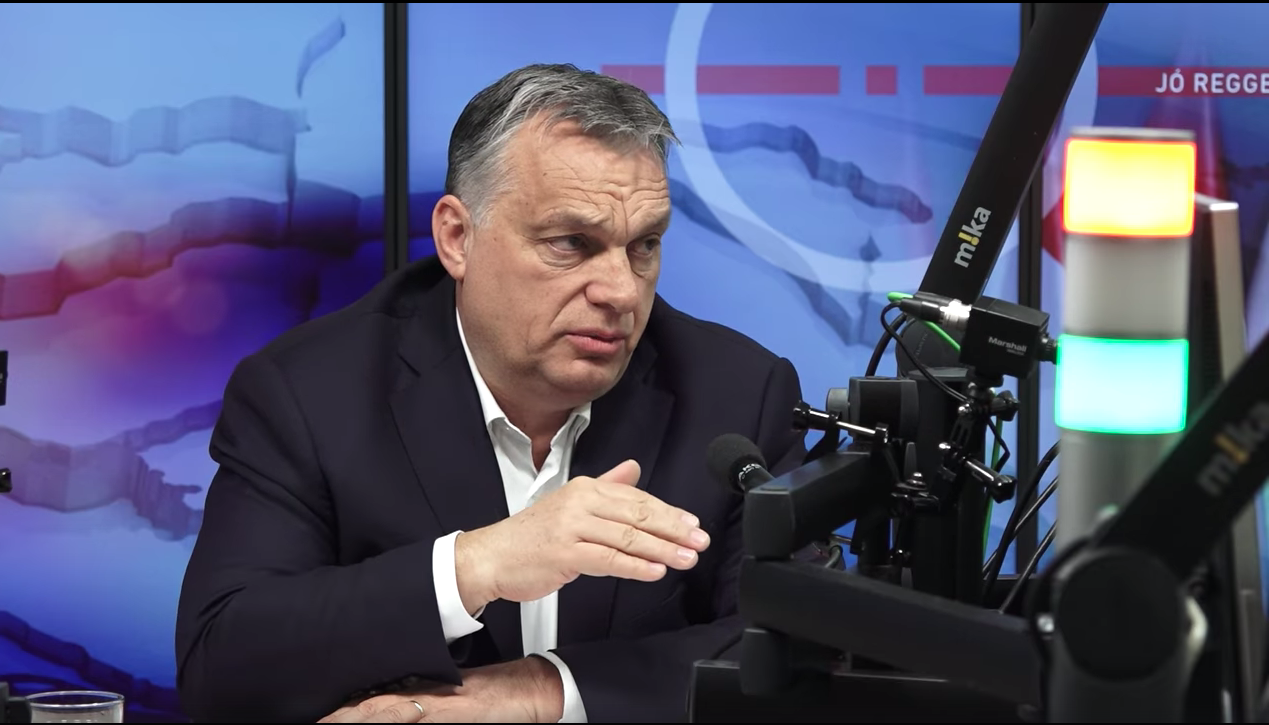
Orbán in the Kossuth Rádió, Source: Facebook page of Viktor Orbán
Although several EU member states were already ordering a full or partial closure of schools, in a radio interview on March 13 Orbán still said that this move was not necessary. He argued that the virus cannot infect children, school closure would mean the end of the school year, and teachers would have to take unpaid leave.
On the same day, independent media outlets published several articles that showed how schools have already been impacted by the virus. It turned out that a child of a confirmed COVID-19 patient was a student of a renowned high school in Budapest and that, based on parents’ requests, headmasters of several schools allowed children to miss classes. In addition, two teachers’ unions contradicted the PM’s announcement. One of them stated that the closure of schools would not mean the end of the school year since teaching could be continued remotely. They also said that if the government did not react to their proposals, they would encourage parents to provide justifications for the absence of their children.
Soon it became clear that even some government politicians disagreed with Orbán’s position.
On March 13, a meeting of the seven parliamentary political parties and government representatives started at 6 pm in the building of the Prime Minister’s Office. The opposition had already argued for school closure earlier but, according to several opposition members, it was surprising that even the governing parties, the junior Christian Democratic party in particular, supported this position. One Christian Democrat told Direkt36 that, contrary to Fidesz, they had thought in the past days that another education method should be introduced. In their view, if parents preferred school closure, then their opinion should have been taken into consideration. “This was not a health question but a social issue,” the politician said.
By then, Fidesz also realized that public opinion went against the government’s position. As Fidesz faction leader Máté Kocsis told those present at the meeting, his child was among the very few ones still going to the kindergarten group, and other parents stopped taking their kids even though they knew he would be aware of any potential threat. He concluded that parents had already made up their minds, and this must be taken into consideration.
Gulyás, who also attended the meeting, hinted that closure was being considered. According to an opposition politician, the minister said that the government had not yet taken a decision but there were many arguments that would have justified such a move.
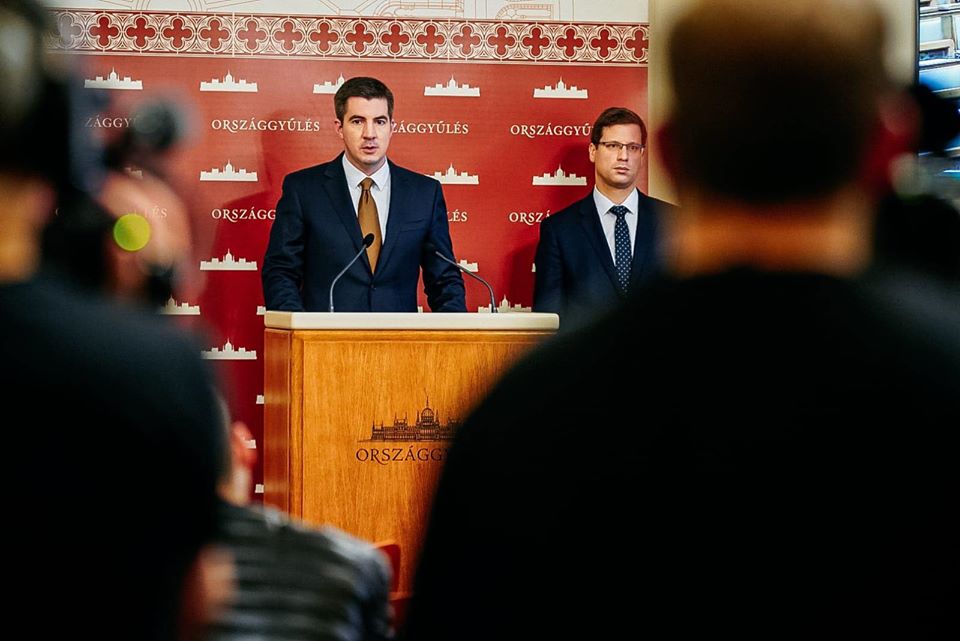
Kocsis and Gulyás, Source: Facebook page of Máté Kocsis
Orbán also felt the change of mood. According to a government politician, he received information from various sources during the day, as he attended the briefing of the COVID-19 Operational Group, the team in charge of the national response, and met with virologists and mathematicians. “He also heard that people’s attitudes changed and that parents stopped taking their children to schools,” the politician said.
“This was the peak of hysteria, both the press and the public kept saying schools should be closed,” another government source said. The source added that even though Orbán does not like to “give in to press panic,” he felt he had to take a move to regain control of the situation. “He is able to let go his previous decisions. If life overrules him, then he adopts,” the source said.
The government was looking for a solution that would allow Orbán to save face. On Friday evening after 9 pm, the Prime Minister announced in a live Facebook video that schools would be switching to digital education. This was communicated as an intermediary solution which was not entirely contradicting his earlier position from the morning.
A friendly atmosphere
In the meantime, an important legal question arose. Decrees adopted during the state of emergency expire in 15 days, meaning that for example the decision about the closure of universities would have become invalid by the end of March. The government was looking for a solution for a prolonged epidemic. They came up with the so-called authorization law, which eventually triggered an ugly confrontation between the government and the opposition, even though the negotiations started unusually peacefully.
On March 18, the government invited representatives of the seven parliamentary parties to discuss its concept proposal at 6:30 pm in the building of the Prime Minister’s Office. Opposition parties received the draft law about “the defense against the coronavirus” a few hours before the meeting. The main point of the only three-page-long proposal was that the government was asking for authorization from Parliament to rule by decrees indefinitely, until the epidemic lasted, in issues related to the epidemic.
The meeting was held in a surprisingly constructive mode according to several people present. This time, the government did not push opposition criticism aside but seemed open to changes or tried mitigating concerns.
Provisions changing the Criminal Code to strictly punish scaremongers were also part of the proposal. Timea Szabó, faction leader of the opposition Dialogue party, said at the meeting that this sent a bad message and many would interpret it as aimed at journalists.
In response, Fidesz faction leader Máté Kocsis and state secretary Balázs Orbán (no relation to the Prime Minister) said that this did not target journalists but rather those individuals who caused panic by spreading false rumors about the lockdown of Budapest on Facebook and Youtube. They stated that these kinds of false news posed a bigger risk during an epidemic and sanctions should be increased to discourage them. Kocsis added that the text of the proposal was vague enough that no judge would sentence anyone on its basis.

Kocsis and Orbán, Source: Facebook page of Viktor Orbán
The opposition also objected that the authorization did not have an end date. As Tamás Harangozó, an MP from the Socialist Party recalled, “reading the text, the word coup d’état came to my mind,” but he also added that he thought the point of this meeting was to find a compromise acceptable to all of them.
The opposition also criticized that, according to the government proposal, only the Parliament could withdraw the authorization before the end of the epidemic, which they found unacceptable because the government had a two-thirds parliamentary majority, thus almost full control of the legislation.
Opposition politicians suggested to include various time limits, such as 30 or 90 days, for the authorization. But Fidesz opposed this, raising the possibility that the Parliament cannot be convened due to the epidemic. The opposition’s reaction was to include some sort of an automatism into the system, meaning that if the Parliament cannot hold sessions, then the deadline of the authorization would be automatically prolonged. Also present at the meeting, Minister of Justice Judit Varga indicated that she was not authorized to negotiate about the proposals but said that she would forward them to the government.
Both sides recalled that the atmosphere of the meeting was good. Tímea Szabó not only praised Kocsis, but also said that Judit Varga, known for her confrontational style, “listened to everyone, she was kind”. In an interview two days later, Kocsis praised the constructive tone, saying, “we made concessions anyway, because it’s not a power struggle, not a debate on the usual political agenda.”
Opposition MPs expected the negotiations to continue. According to Gergely Arató from the Democratic Coalition (DK), one of the government representatives said that “another consultation will probably be necessary.” Arató then thought this could happen sometime over the weekend. Trusting his, participants tried to keep what was said confidential, and they did not hold a press conference after the consultation.
Soon, however, the first critical voices about the authorization law appeared from the opposition side. Based on leaked information, left-leaning newspaper Népszava reported on the new bill. László György Lukács, an MP from the rightwing Jobbik party, shared the story on his Facebook page rather critically, referring to “corona dictatorship.” Independent opposition MP Ákos Hadházy wrote that day, also on Facebook, that he would not vote for the proposal without a deadline. He said he would not “give full power” to Orbán.
These comments were noticed by the government. Some found Lukács’s Facebook post especially infuriating since he was part of the meetings where parties agreed to cooperate on the law. “There is no point in negotiating when someone behind closed doors is constructive, but then insults us just to collect likes,” said a pro-government politician, adding that it seemed that the opposition was using the epidemic to build their own narrative about Orban’s dictatorship. Lukács, however, told Direkt36 that he had posted the critical comment because his personal intuition at the time was that the government would not cooperate with the opposition.
Habony’s strike
Fidesz changed its position on Friday, though they had not immediately gone public with it. One opposition politician felt the change when he contacted a member of the Fidesz faction dealing with technical affairs to ask if there was already a date for the next seven-party consultation. The opposition MP was surprised when the Fidesz politician’s suggested that he should ask Kocsis, the leader of the faction who usually did not address dates and similarly practical issues. This suggested to the opposition MP that Fidesz’s strategy had changed and that no further substantive negotiations were expected.
Late Friday night, the justice minister presented the bill to the parliament. The draft, which was made public at this point, adopted only one of the opposition’s many requests. This was only a wording suggestion, which said that the government may exercise the special authority in the context of the epidemic, to the extent necessary and proportionate. Apart from this, there were no more concessions to the opposition.
Orbán decided that it was not worth compromising with the opposition. According to government sources, he believed that the opposition was not united, so even if he made an agreement with them, not all opposition parties and politicians would adhere to it. On the government side, many thought that the deal would thus probably only be short-lived, and this would also cause political damage to the government. In order not to compromise, they thought that it was necessary not to include a deadline in the Authorization Act. It was obvious for them that, in this case, the opposition would not vote for it.
According to government sources, Árpád Habony, the Prime Minister’s powerful informal adviser, also played a role in the decision. Habony, like Orbán, likes confrontational solutions. One of Habony’s colleagues said once that the adviser, who practices Kendo, a Japanese martial art, likes fast and tough moves not only in Kendo but also in politics.
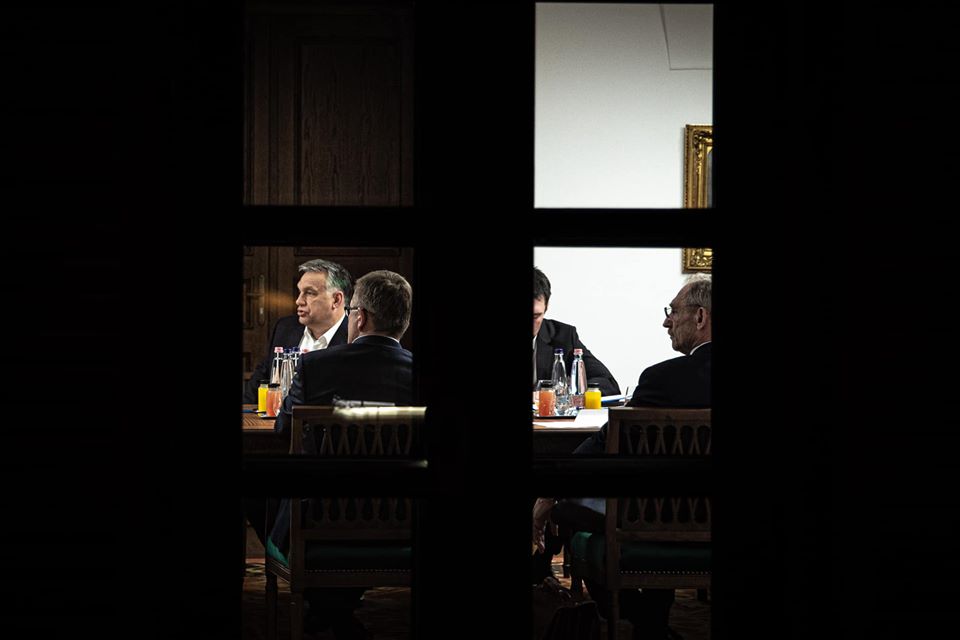
Orbán with his government, Source: Facebook page of Viktor Orbán
In addition, the government conducted opinion polls, which showed that there was enough support for the government’s approach, and this reassured them that they should stick to the more confrontative concept. “We saw that we are on track,” said a source familiar with the polls, which covered not only the authorization law itself but also the attitude expected from the opposition and the need for cooperation between the political sides.
Meanwhile, the opposition came under increasing pressure as critics of the government, NGOs and left-wing intellectuals, came out against the bill. Opposition parties initiated another seven-party meeting for Monday, hoping they could still amend the text. In the background, however, it became clear that there would be no more substantive cooperation. One opposition MP had a brief telephone conversation with a minister who said, “it’s good for us if you do not to vote for the proposal.”
The government’s changed attitude became clear to the general public on Monday, March 23, when the parliament was set to vote on a procedural measure that paved the way for the final approval of the bill. Orbán announced then that he would not seek cooperation with the opposition. Turning to his fellow MPs from the governing parties, he said: “It does not matter what the opposition is afraid of, this should be their problem. I need 133 brave people, the 133 bravest people in the country, and those are here on the government side.”
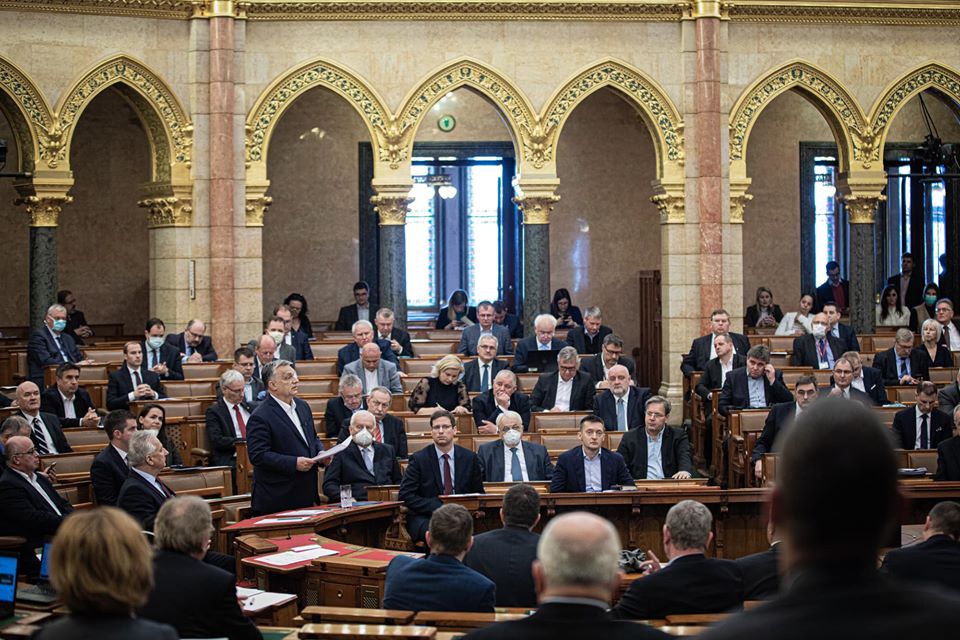
Orbán in parliament, Source: Facebook page of Viktor Orbán
As expected, the opposition parties voted against the measure.
After the vote, a senior member of the Fidesz faction told an opposition politician that “we would have been fools to negotiate, then the opposition press would have focused on the unemployment instead of talking about dictatorship.” Fidesz’ rationale was that if they get into this conflict with the opposition, then they can project themselves acting as quickly as possible for the people, while the opposition is dealing with “an abstract nonsense.”
The government did everything it could to strengthen that picture, not only after the procedural vote, but also the following week, when the final bill was adopted – without the support of the opposition.
Flawed machine
The government felt that the Authorization Act episode ended favorably for them. Soon, however, another issue emerged that showed that the government’s decision-making process was still not as disciplined as it had been before the crisis.
In the last days of March, the government introduced a bill that aimed to restrict the powers of mayors, only to withdraw it almost immediately.
A few days earlier, there was no sign that the government was in any way prepared to limit the power of the mayors. On March 27, two ministries issued a guideline to the mayors. The eight-page document detailed how municipal leaders can use the extra powers they automatically received when the government announced the state of emergency. The government issued this guidance because some mayors apparently misused these powers and made decisions, like adopting budgets, that had nothing to do with the epidemic.
The guidelines did not indicate though that the government wanted to curb the powers of the mayors. However, a few days later, on the night of March 31, Deputy Prime Minister Zsolt Semjén submitted to the parliament a package of proposals that included a bill that would have significantly restricted the mayors’ decision-making power. It said that during a state of emergency, mayors’ decisions must be approved by capital and county defense committees headed by government commissioners.
According to a government source, not even the Fidesz parliamentary faction had been informed about the concept developed in the Ministry of Justice. Kocsis, the leader of the faction, opposed this proposal and so did Gergely Gulyás, head of the Prime Minister’s Office. According to one government source, Gulyás called the proposal “stupid.”
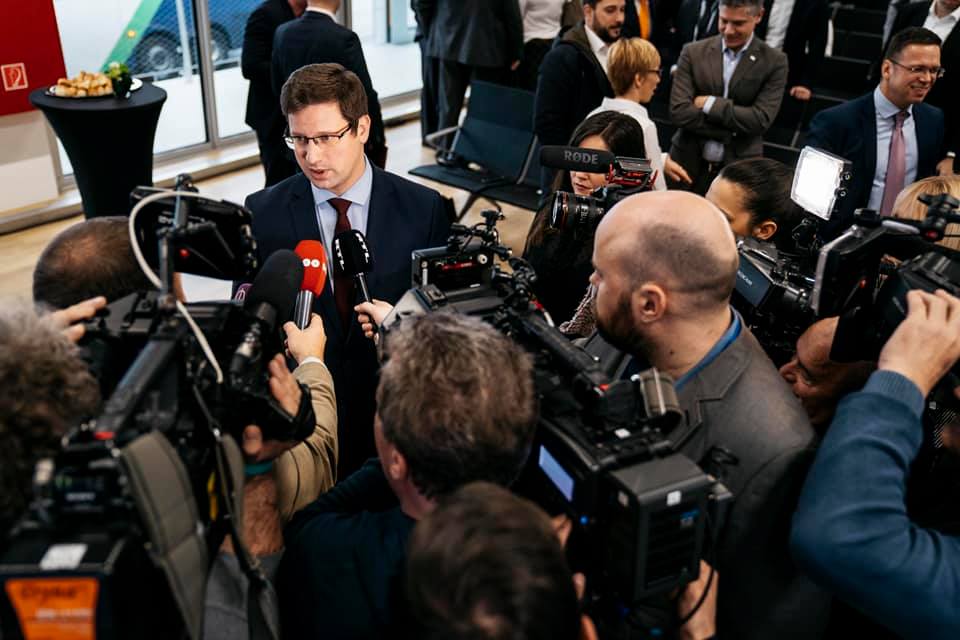
Minister Gulyás, Source: Facebook page of Gergely Gulyás
While some in the government thought that some level of control over mayors would be warranted, others believed that the bill’s timing was not appropriate. By that time, the government had received serious criticisms not only from Hungary but also from abroad for the authorization law.
Critics of Orbán said that the government wanted to take revenge on the opposition mayors of major cities, including the capital Budapest, over the results of last fall’s municipal elections (which were largely disappointing for Fidesz). Opposition mayors harshly criticized the bill, but mayors from Fidesz also joined the protest.
One of the critics was András Cser-Palkovics from Székesfehérvár, who previously served as Fidesz’ deputy spokesman in the party’s presidential staff. Cser-Palkovics – through the city’s press department – confirmed to Direkt36 that he did not support the proposal because, in his view, “the management of a city is the responsibility and task of the head of the municipality.” He also shared this opinion with government officials and members of parliament. “I am pleased that the proposal has finally been withdrawn, which also shows that the government is ready to accept the opinions and suggestions of others,” he said.
The government finally withdrew the proposal on the afternoon of April 1, so the bill did not even survive a day. The decision was announced by Gulyás. He did not talk about disagreements within the government at the time, only said that since the opposition did not agree with the change and the government was open to cooperation, it would be withdrawn.
The government’s actions have appeared less hectic since then. Orbán is keen on projecting the image that he has things under control. He’s there to receive protective gear shipments from China, he visits hospitals, and he is the one who makes the key announcements as well.
“He is a prime minister of war,” said a source close to Orbán. According to the source, the prime minister feels that he is in his element when he can act as a crisis manager, a problem-solver. That’s why another source with close ties to the government was surprised when he heard Orbán saying at a press conference early this year that he was planning for a quiet time until the next elections that are scheduled for 2022. It was strange to hear that, said the source, because “Orbán likes to have a fight.”
Szabolcs Panyi contributed reporting to this article.

